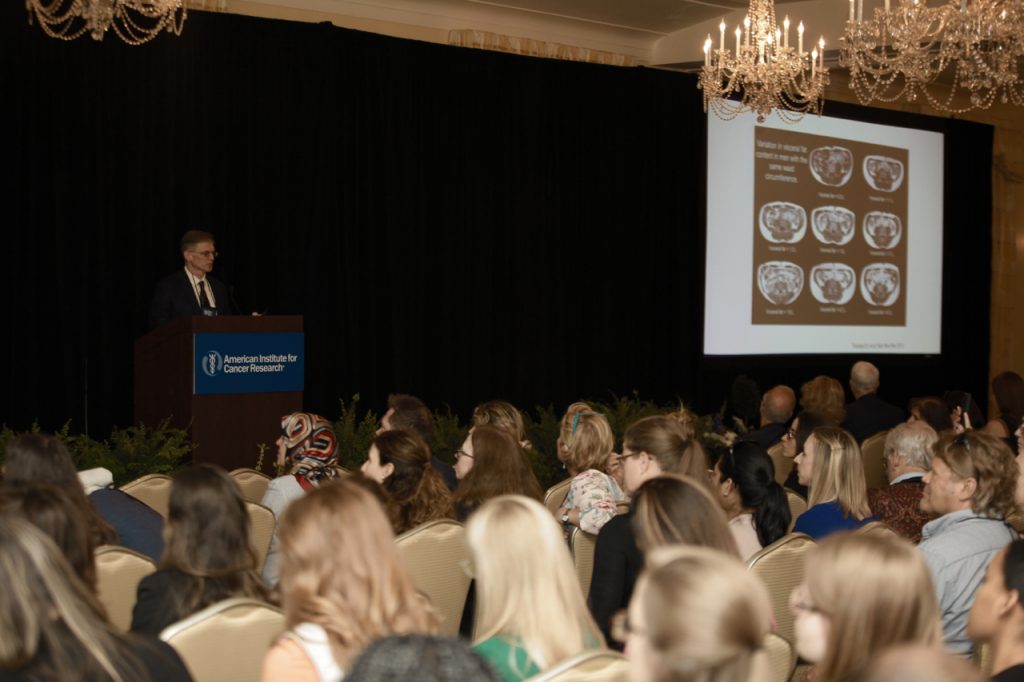The recently concluded AICR 2019 Research Conference covered a broad spectrum of lifestyle factors and their role in cancer prevention, care and survivorship. The conference started with Dr. Edward Giovannucci, MD, ScD elegantly summarizing three decades of research and musing on where the field is heading in his talk entitled “Beyond the Blueprint – Past and Future Research in Diet, obesity, Physical Activity and Cancer.

Having set the scene, the keynote address, on “Obesity, Metabolic Dysregulation and Cancer,” was given by Dr. Michael Pollak, MD of McGill University. A clinical oncologist and translational scientist, Dr. Pollak emphasized the growing obesity epidemic worldwide. He presented the genetic and environmental drivers of the obesity epidemic, and emphasized the importance of breaking out of the silos of research on cancer, obesity and immunology.

The buzz continued throughout the week with participants presenting on the connections between diet, obesity, physical activity and cancer. There were sessions on new technologies and approaches for assessing body composition and the new AICR/WCRF Cancer Prevention Recommendations and lifestyle guidelines; on mitigating the adverse effects of cancer and its treatment through diet, exercise, and weight management; and on links between energy balance, metabolism, and cancer, among others.
The conference closed with the plenary session, “Three Years of Change and Progress—Convergence of Oncology with Lifestyle,” co-chaired by Dr. Jennifer Ligibel and Scott Bultman. This theme was apparent throughout the conference but this session emphasized the critical impact of lifestyle on each of the main systemic therapy approaches, chemotherapy, targeted therapeutics and immunotherapy.
Here is a sample of quotes from speakers during the diverse sessions:
“Our session, Obesity and Cancer: When Systemic Metabolism Meets Cancer Cell Metabolism, brings these two topics together, in the same way that this conference is filling in important gaps in research and identifying the path of future research driven by the AICR Expert Report.”
Dr. Stephen Hursting, UNC
“Muscle mass is a poor predictor of health compared to muscle strength.”
Dr. William Evans, Duke University
“We’ve answered ‘if’ obesity is a factor clearly. Now we need to pivot to how to reduce the impact of obesity.”
Dr. Stephen Hursting, UNC
“Rapidly-dividing stem cells that reside in the crypt of the colon can become perturbed to emerge as colon cancer.“
Dr. Robert Chapkin, Texas A&M University
“Relying on a healthy body weight to determine how much exercise one should be doing is not a good approach.”
Dr. Neil Iyengar, Sloane Kettering Memorial Hospital
“When there’s too much insulin in the body, the fat cells’ job is to store that extra energy. But the other cells—in organs like the breast, colon and prostate—use that energy to divide….If damaged cells divide, new damaged cells want to survive. When you multiply that by billions of cells, the chances of developing cancer increase.”
Dr. Michael Pollak, McGill University
“The role of diet, body weight and physical inactivity on cancer risk is largely mediated through their integrated action in increasing growth-promoting hormones and inflammation, the causal factors.“
Dr. Edward Giovannucci
“Very few things have happened in the history of humans as quickly as the growing prevalence of overweight and obesity.“
Dr. Michael Pollak
“Is obesity a driver or consequence of the microbiome? There is evidence for both.“
Dr. Scott Bultman
“eHealth interventions for obesity management are generally found to be effective compared to usual care or minimal treatment.“
Dr. Deborah Tate
“Obesity-related hormones activate pro-survival pathways to increase the probability that mutated cells will survive rather than undergo death.”
Dr. Michael Pollak





